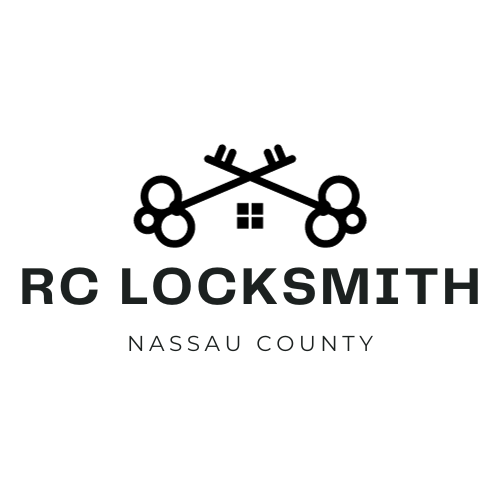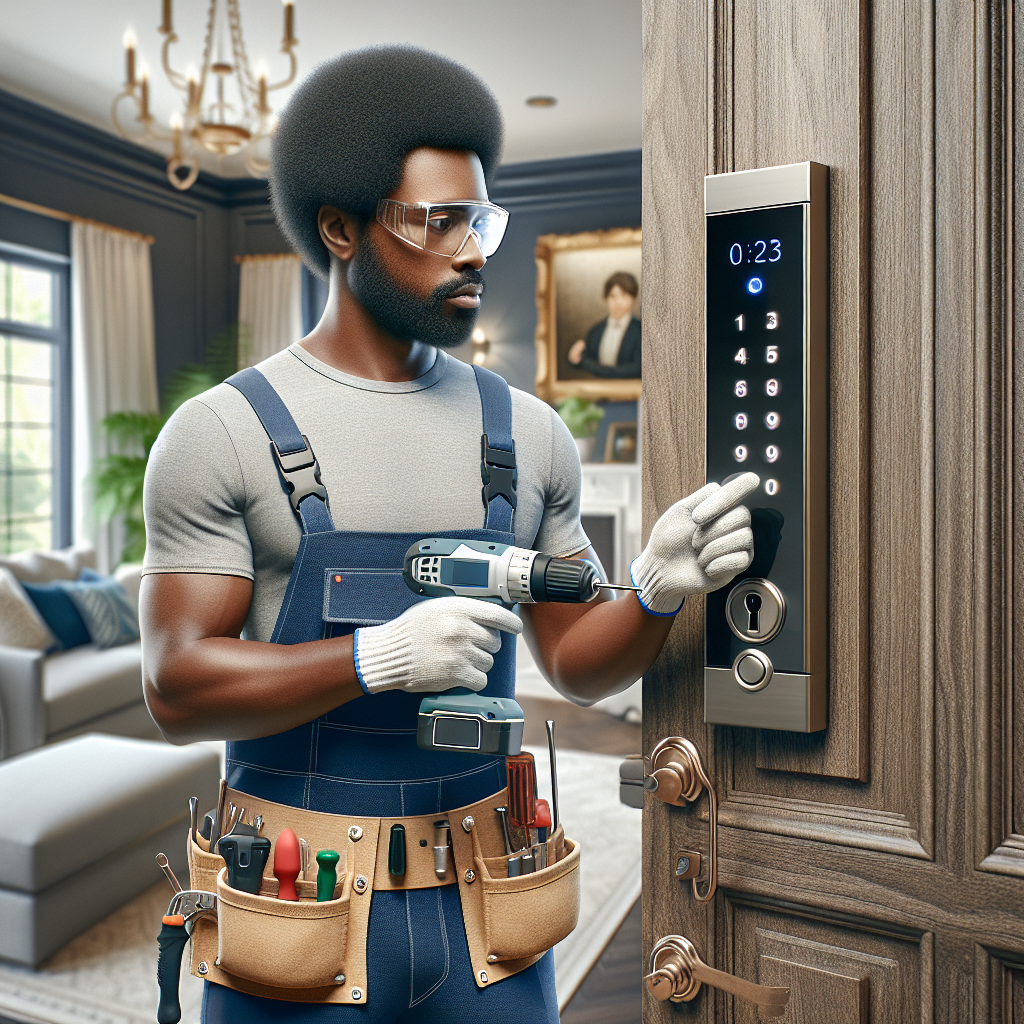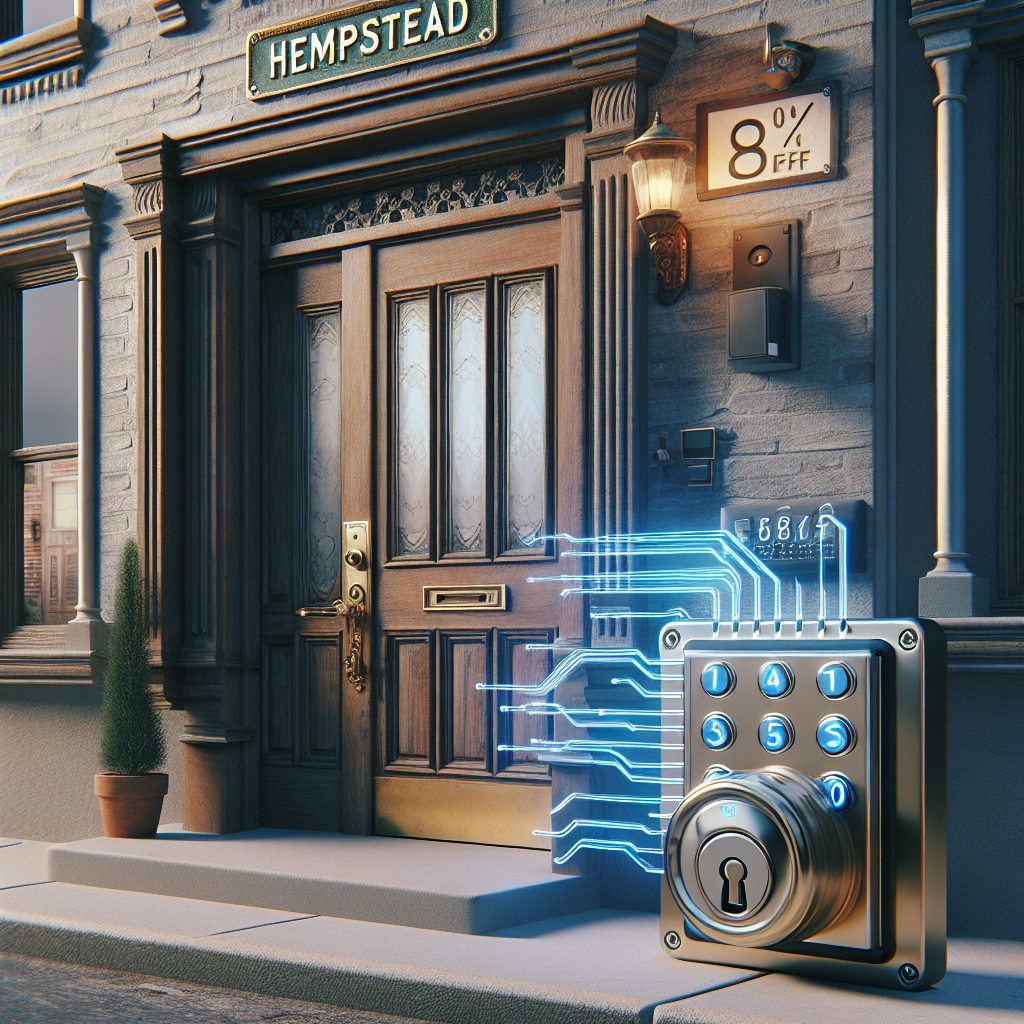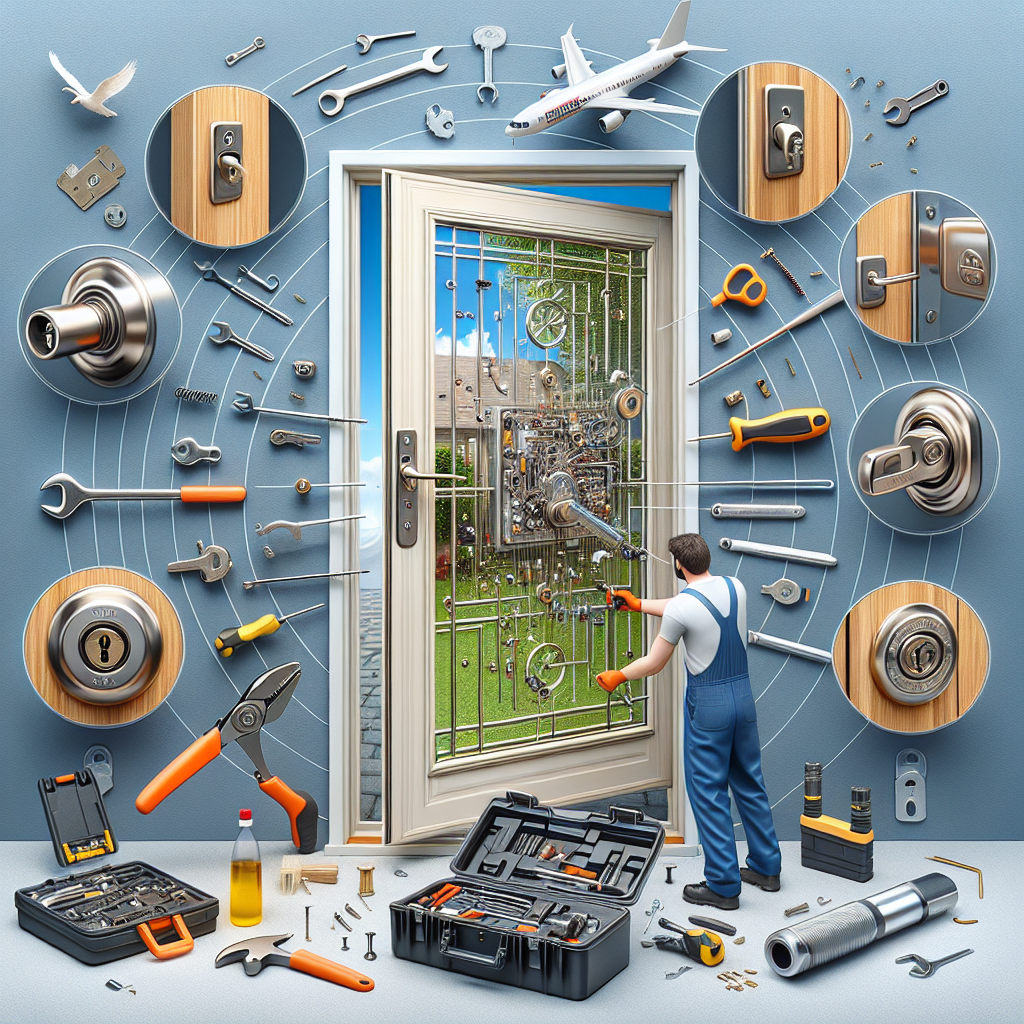In an era where convenience and security coalesce, Smart Locks emerge as a pivotal innovation in home security technology, especially in the vibrant neighborhoods of Nassau County. A smart lock not only grants seamless access with advanced encryption and remote locking capabilities but also integrates with broader smart home systems, allowing homeowners to elevate their domicile into a bastion of modern living. Incorporating features such as biometric access, geofencing, and activity logs, these devices provide Nassau residents peace of mind through enhanced control over who enters their homes and when. The sophistication of this technology reflects a quantum leap from conventional locks, marking the dawn of an age where your smartphone becomes the virtual key to your castle.
As we delve deeper into the nuances of installing smart locks in Nassau County homes, we shall uncover the intricate web of benefits and considerations that accompany this digital upgrade. The forthcoming discussion will pivot on the practical takeaways homeowners should be cognizant of—ranging from compatibility with existing home infrastructure to the selection of the most reliable brands tailored to the unique Nassau climate and lifestyle. Anticipate a comprehensive walkthrough of the installation process, tips for maintaining optimal performance, and insights on maneuvering the potential learning curve that accompanies adopting this cutting-edge technology. Stay tuned as we prepare to navigate the robust intersection of smart technology and home security, ensuring your sanctuary remains both inviting and impregnable.
Key Takeaways
1. Smart locks offer Nassau County homeowners advanced security features and convenience, such as remote access, keyless entry, and custom access codes for family members and guests. This technology allows for greater control over who enters the home and keeps track of access events.
2. Installation of smart locks should be handled by a professional to ensure proper setup and integration with existing home security systems. This ensures that the smart lock works flawlessly with other smart home devices and provides optimal security and functionality.
3. Compatibility with the homeowner’s lifestyle is a significant consideration when installing smart locks in Nassau County homes. Homeowners should select a smart lock that integrates seamlessly with their smart home ecosystem, whether it be Apple HomeKit, Google Assistant, or Amazon Alexa, to enable voice commands and remote management.
4. Battery life and backup options are critical in maintaining the reliability of smart locks. Homeowners should be aware of the battery type and life expectancy, as well as have a contingency plan, such as a physical key or external battery pack, to prevent lockouts due to power issues.
5. Homeowners should explore the varying features of smart locks, including auto-locking, geo-fencing, and tamper alerts, to determine which features best meet their security needs and personal preferences. Advanced features may offer additional peace of mind through enhanced security measures and user-friendly options.
Choosing the Right Smart Lock for Your Home
When upgrading to smart locks in Nassau County, it’s crucial to select a lock that matches your needs and lifestyle. Consumers should consider factors such as compatibility with existing smart home systems, the type of authentication they prefer (keypad, fingerprint, smartphone control), and level of security. Popular brands catering to various functions and aesthetics include August, Schlage, and Yale. It’s also important to check if the smart lock is rated by the American National Standards Institute (ANSI), which ensures the lock meets certain performance standards.
Understanding Smart Lock Installation Requirements
Before proceeding with the installation of a smart lock, homeowners must ensure their door is compatible. Door compatibility includes having the proper deadbolt configuration, thickness, and alignment. Sturdy door frames and high-quality deadbolts form the foundation for effective smart lock performance. It may be necessary to adjust or replace the existing deadbolt for optimal smart lock installation. Moreover, having a stable Wi-Fi connection is vital for remote access features.
DIY vs Professional Smart Lock Installation
Many smart locks are designed with DIY installation in mind. However, the complexity of installation can vary. Those comfortable with basic tools and instructions can likely handle the installation themselves. For more complex systems or those who prefer assurance of a flawless setup, professional installation is recommended. Hiring a local Nassau County locksmith or smart home technician can ensure proper installation, integration with other smart home devices, and tutorial on usage.
Integration with Home Automation Systems
Integrating smart locks with existing home automation systems enhances the convenience and security of your Nassau County residence. Most smart locks work with platforms like Apple HomeKit, Amazon Alexa, or Google Assistant. This allows for seamless control and monitoring of your home’s entry points. Integration may also enable features like automatic locking when the system detects you’ve left the area, or remote access to let in guests when you’re not home.
Security and Privacy Considerations
With any smart home device, security is a paramount concern. Homeowners should prioritize smart locks with strong encryption methods, such as AES 128-bit encryption, to protect against hacking. It’s also advisable to regularly update the lock’s firmware to mitigate security vulnerabilities. Privacy settings should be reviewed and configured to limit unnecessary data sharing. Adopting a proactive cybersecurity approach, including the use of strong, unique passwords and two-factor authentication, helps protect against unauthorized access.
Cost Analysis and Budgeting for Smart Locks
Installing smart locks in Nassau County homes can be an investment. Costs range depending on the lock brand, model, and features. Additional expenses might include professional installation fees and possible upgrades to door hardware for compatibility. Homeowners should factor in ongoing costs such as battery replacement or subscription fees for advanced features. Creating a budget that accounts for upfront and future expenses is sensible for making a cost-effective smart home enhancement.
Maintenance and Troubleshooting
Regular maintenance ensures the longevity and reliability of smart locks. This includes battery checks and replacements, cleaning touchpads and sensors to prevent malfunction, and testing the lock’s functionality periodically. For troubleshooting common issues like connectivity problems or unresponsive electronics, most manufacturers offer customer support and online resources. In cases where technical problems persist, contacting a Nassau County technician who specializes in smart home technology may be necessary.
Local Regulations and Compliance
Nassau County homeowners planning to install smart locks should be aware of any local regulations or building codes that may apply. This includes codes that could affect the type of lock selected or the method of installation. Checking with local authorities or a qualified locksmith can ensure compliance with all relevant regulations and avoid potential fines or the need to revert changes.
What Are the Top Tips for Nassau County Residents Installing Smart Locks?
- Assess home compatibility and Wi-Fi strength before purchasing a smart lock.
- Evaluate and compare different smart lock brands and models for best fit.
- Consider professional installation to guarantee proper setup and integration.
- Regularly update your smart lock’s firmware to maintain optimal security.
- Ensure your smart lock conforms to local Nassau County regulations.
Can smart locks be installed on any door in Nassau County homes?
While smart locks are designed to be versatile, they may not fit every type of door. Before purchasing a smart lock, homeowners should verify that the lock is compatible with their door’s size, style, and material. It’s also important to check for any local building codes or regulations in Nassau County that may apply.
Do you need a professional to install smart locks in Nassau County?
Many smart locks are designed for DIY installation, with most requiring just a screwdriver. However, some homeowners might prefer hiring a professional to ensure the lock is set up correctly, especially for more complex systems or if modifications to the door are required.
Will installing a smart lock affect my home insurance in Nassau County?
Installing smart locks can sometimes affect home insurance policies. Some insurance companies may offer discounts for homes with these types of security features. It’s best to consult your insurance provider to understand how installing a smart lock might impact your policy.
Are smart locks vulnerable to hacking?
Like any Internet-connected device, smart locks have some risk of being hacked. However, reputable smart lock manufacturers incorporate strong encryption methods and other security measures to protect against unauthorized access. Regularly updating your smart lock’s firmware can further reduce this risk.
What happens if the smart lock’s battery dies?
Most smart locks are equipped with a low-battery alert to prevent lockouts. In case the battery dies unexpectedly, many smart locks still offer a traditional key function or an alternative way to power the device temporarily, like a USB port.
Can smart locks withstand Nassau County’s weather conditions?
Smart locks are generally designed to be weather resistant, but Nassau County homeowners should look for locks that are rated for the area’s specific weather conditions, including humidity, temperature variations, and potential storm exposure.
How do smart locks integrate with other smart home systems in Nassau County?
Many smart locks seamlessly integrate with various smart home systems, allowing for remote control and monitoring. Homeowners should ensure the smart lock they choose is compatible with their existing smart home ecosystem and protocols, such as Z-Wave, Zigbee, Wi-Fi, or Bluetooth.
What features should I look for in a smart lock for my Nassau County home?
Homeowners should consider features such as ease of use, connectivity options, access features like keypads or biometrics, guest access capabilities, compatibility with smart home hubs, and overall security level when choosing a smart lock for their home.
Is there a monthly fee associated with using a smart lock?
Most smart locks do not require a monthly fee for basic use. However, some advanced features, like remote access through a smartphone app, may need a subscription or come with additional costs. Homeowners should review the fee structure before making a purchase.
How do I maintain my smart lock to ensure it continues to function properly?
Regular maintenance for a smart lock includes keeping the firmware updated, checking the battery life, cleaning the lock to prevent debris build-up, and making sure the lock’s mechanisms are functioning smoothly. Regular checks will ensure the lock’s longevity and reliability.
Final Thoughts on Installing Smart Locks in Nassau County Homes
The evolution of home security is on the rise, and smart locks are at the forefront of this change, offering convenience and enhanced security to homeowners in Nassau County. With the ability to control access to your home remotely and track who comes and goes, smart locks provide not just peace of mind but also a great way to simplify your daily routine. Residents of Nassau County should weigh these benefits against considerations like compatibility, security, and insurance implications when deciding to make the transition to a smart locking system.
As we move towards a more connected and technologically integrated lifestyle, the adoption of smart locks appears to be a logical step forward for Nassau County homeowners. Ensuring the product you choose fits your specific needs and taking the necessary precautions to maintain its security will help guarantee that the integration of smart locks into your home is a success. Whether you opt for a DIY installation or professional assistance, the key is to invest in a robust and reputable system that will safeguard your home for years to come.







